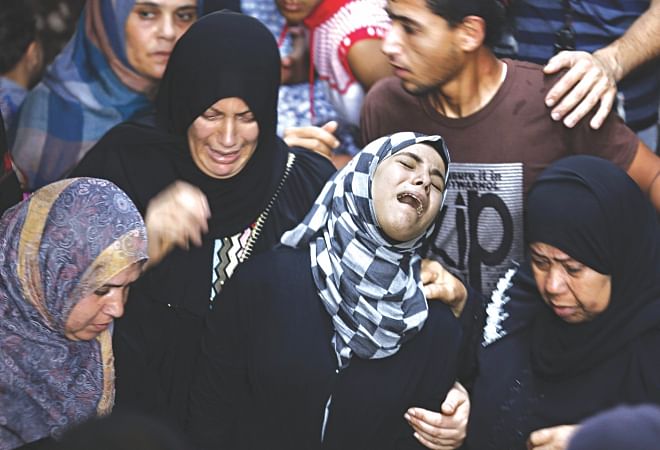Truce calls fall on deaf ears
Truce calls fall on deaf ears
Death toll tops 600; 1 lakh displaced

Israel pounded targets across the Gaza Strip and Hamas continued it's rocket fires yesterday as top US and United Nations diplomats pursued talks on halting the fighting that has claimed more than 600 lives.
UN chief Ban Ki-moon yesterday demanded that Israel and Hamas halt the spiralling violence as he led diplomatic efforts to end bloodshed that has killed 620 Palestinians.
Following top-level truce talks in Cairo, the UN secretary-general headed to Israel to deliver his message in person as the 15-day conflict showed no sign of easing.
"My message to Israelis and Palestinians is the same: Stop fighting, start talking and take on the root causes of the conflict so that we are not at the same situation in the next six months or a year," he said.
In Cairo, US Secretary of State John Kerry discussed ceasefire proposals with Egypt's President Abdel Fattah al-Sisi with both voicing guarded hopes of an end to the violence.
Kerry again placed the onus on Hamas to accept a ceasefire to end the raging conflict in Gaza, voicing support for an Egyptian truce initiative as a "framework" to end the fighting.
But neither side showed any willingness to pull back, with Israel refusing to halt its fire without finishing a ground operation to destroy tunnels used by militants for cross-border attacks.
Even as the diplomats talked, Palestinian rockets continued to fall on central Israel, prompting US airline Delta to indefinitely suspend its flights to the Jewish state over security concerns.
And there was more death on the ground in Gaza where the Palestinian toll rose over 620. Among the dead were two children and nine women, one of whom was pregnant, medics said.
On the streets of Gaza City, there were very few people and the only shops doing trade were those selling fruit and vegetables.
In the morning, two warning shots were fired at an 11-storey building in the city centre that houses the offices of Al-Jazeera and global news agency AP, prompting journalists and a handful of residents to flee into the street.
"We came here from Shejaiya," said a woman who had sought refuge in the building.
"There doesn't seem to be anywhere that is safe," she said, huddling on the pavement with three female relatives, nine children and an elderly man.
Since the offensive, more than 100,000 Gazans have fled their homes, seeking shelter in 69 schools run by the Palestinian refugee agency UNRWA.
The Israeli military said two more of its soldiers had been killed in the fighting a day earlier, hiking the overall Israeli death toll to 29, among them 27 soldiers who died in the past four days.
It also confirmed a soldier whom Hamas militants claimed they had kidnapped was dead, saying his body remained unaccounted for.
Despite its rising body count, Israel said it would only halt its Gaza offensive after laying waste to a network of sophisticated tunnels used by militants for cross-border attacks.
Hamas has laid out a list of demands for halting its fire, including a lifting of Israel's eight-year blockade on Gaza, the release of dozens of prisoners, and the opening of its Rafah border crossing with Egypt.
As he touched down in Tel Aviv, UN chief Ban demanded the two sides immediately hold their fire as he sought to drive forward regional efforts for a ceasefire.
Describing Hamas rocket fire on Israel as "shocking," he said it must "stop immediately".
But he also said Israel must exercise "maximum restraint" in Gaza, and he urged it to take a hard look at some of the root causes of the conflict "so people will not feel they have to resort to violence as a means of expressing their grievances".
Since last week, when Hamas rejected an Egyptian ceasefire proposal that was accepted by Israel, there has been growing world pressure on the Islamist movement to halt its fire and stop raining rockets onto Israel.